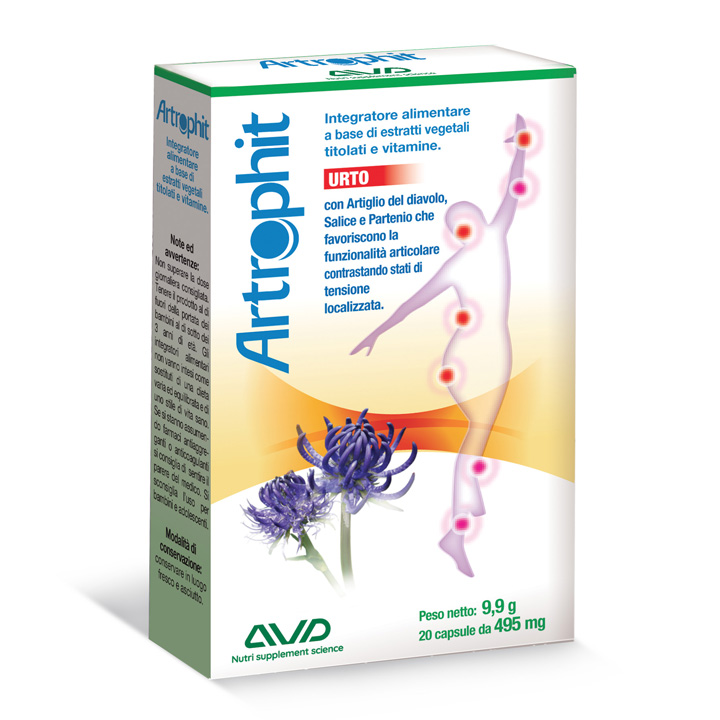
Integratore alimentare a base di estratti vegetali titolati e vitamine, utile nel trattamento degli stati infiammatori e dolorosi a carico dell’apparato osteo-articolare e muscolare.
Finalità salutistiche:
Ogni capsula di Artrophit Urto contiene 100 mg di IridoforceTM, un estratto di Harpagophytum Procumbens (titolato al 20% minimo di arpagoside), ottenuto mediante un processo di estrazione brevettato che ne garantisce un elevato grado di purezza e un’alta concentrazione. Dagli studi condotti è stato possibile dimostrare che il gluco iridoide arpagoside contenuto nell’IridoforceTM favorisce l’inibizione della ciclo-ossigenasi di tipo 2 (COX -2), enzima indispensabile nella sintesi della prostaglandina E2 (PGE2), che è alla base del processo infiammatorio, inibendo la flogosi e i conseguenti eventi dolorosi. Inoltre IridoForceTM stimola significativamente la sintesi di acido ialuronico favorendo la formazione di nuova matrice extracellulare (ECM). L’associazione con estratti titolati di Salice e Partenio, contribuisce a potenziarne l’azione, rendendo il prodotto particolarmente utile nelle problematiche a carico dell’apparato osteo-articolare e muscolare. La presenza di vitamina B2 e B6, essenziali per la salute dei nervi, completano l’effetto del prodotto mentre l’involucro acido resistente DRcapsTM protegge i principi attivi dall’azione dei succhi gastrici contribuendo a mantenere inalterate le loro proprietà.
Ingredienti:
- IridoforceTM (Artiglio del diavolo) estratto secco, titolato 20% in arpagoside
- Partenio estratto secco, titolato allo 0,8% in partenolide
- Salice estratto secco titolato 30% in salicina
- Vitamina B6 (piridossina)
- Vitamina B2 (riboflavina)
- Capsule vegetali acidoresistenti DRcapsTM
Modalità d’uso:
una capsula 2 volte al giorno, preferibilmente dopo i pasti
Confezione:
20 capsule vegetali DRcaps™ acido-resistenti
Note:
conservare in luogo fresco e asciutto
codice Paraf: 923503344
inserito nel registro degli integratori: codice 62493
| tenore medio ingredienti | per 2 capsule | per 100 g |
| Iridoforce™ | 200 mg | |
| Apporto di arpagosidi | 40 mg | |
| Partenio | 200 mg | |
| Apporto di partenolide | 1,6 mg | |
| Salice estr. secco | 200 mg | |
| Apporto di salicina | 60 mg | |
| Vitamina B6 | 3 mg | 214 % |
| Vitamina B2 | 2,4 mg | 171 % |
Bibliografia:
- CHRUBASIK S., et al., Comparison of outcome measures during treatment with the proprietary Harpagophytum extract Doloteffin in patients with pain in the lower back, knee or hip. Phytomedicine, 9, 181-194, 2002.
- WEGENER T, Devil’s claw : from African traditional remedy to modern analgesic and anti-inflammatory. 2000, Herbalgram, 50, 47-54
- CHRUBASIK S, Traditional herbal therapy for the treat-ment of rheumatic pain : preparations from Devil’s claw and stinging nettle. SIG on Rheumatic pain newsletter, 1997
- The effectiveness and economy of Harpagophytum extract in acute low back pain : first results of a therapeutic cohort study.Forsch Komplementärmed, 4, 332-336, 1997
- FIEBICH BL, Heinrich M, Hiller KO, Kammerer N, Inhibition of TNF-A synthesis in LPS-stimulated primary human monocytes by Harpagophytum extract SteiHap 69. Phytomedicine, 2001, 8, 28-30
- JANG M.H., et al., Harpagophytum procumbens sup-presses lipopolysaccharidestimulated expressions of cyclooxy-genase-2 and inducible nitric oxide synthase in fibroblast cell line L929. J. Pharmacol. Sci., 2003. 93(3): p. 367-371
- LEBLAN D, Chantre P, Fournié B, L’harpagophyton dans le traitement de la gonarthrose et de la coxarthrose. Résultats à quatre mois d’une étude prospective multicentrique, contrôlée en double aveugle, versus diacerhein. Rev. Rhum. Ed Fr, 2000, 67, 634-640
- WEGENER T, Lüpke NP, Treatment of patients with Arthrosis of hip or knee with an aqueous extract of Devil’s claw (Harpagophytum procumbens DC). Phytotherapy research, 17, 1165-1172, 2003
- Handa S.S. et al. Plants with antiinflammatory activity. Fitoterapia, LXIII, 1, 3, 1992
- Chrubasik S. et al. Treatment of rheumatic pain with herbal medicine in Europe. Pain Digest Vol: 8, 231-236, 1998
- Ernst E. et al. Phyto-anti-inflammatories: A systemic review of randomized, placebo- controlled, double-blind trials. Rheumatic Disease Clinics of North America Vol: 26, 13, 2000
- Chrubasik S. et al. Treatment of low back pain exacerbations with willow bark extract: a randomized double-blind study. Am. J. Med. 109, 9-14, 2000
- Schmid B. et al. Efficacy and tolerability of a standardized willow bark extract in patients with osteoarthritis: Randomized placebo-controlled, double blind clinical trial. Phytotherapy Research Vol: 15, 344-350, 2001
- Chrubasik E. et al. Salicin and Treatment of Rheumatic Diseases. J. Rheumatol. 30(5):1125, 2003
- Chrubasik E. Et al. Influence of willow bark extract on cyclooxygenase activity and on tumor necrosis factor or interleukin 1 release in vitro and ex vivo. Clin Pharmacol Ther. 73(3):272-4, 2003
- Biegert C. Et al. Efficacy and safety of willow bark extract in the treatment of osteoarthritis and rheumatoid arthritis: results of 2 randomized double-blind controlled trials. J Rheumatol. 31(11):2121-30, 2004
- Khayyal M.T. et al. Mechanisms involved in the anti-inflammatory effect of a standardized willow bark extract. Arzneimittelforschung. 2005;55(11):677-87, 2005
- Murphy J.J. et al. Randomized double blind placebo controlled trial of feverfew in migraine prevention. Lancet 2, 189-192, 1988
- Sumner H. et al. Inhibition of 5-lipoxygenase and cyclo-oxygenase in leukocytes by feverfew. Involvement of sesquiterpene lactones and other components Biochem. Pharmacol. 43, 2313-2320, 1992
- Williams C.A. et al. The flavonoids of Tanacetum parthenium and T. vulgare and their anti-inflammatory properties. Phytochemistry 51, 417-423, 1999
- Kwok B.H. et al. The anti-inflammatory natural product parthenolide from the medicinal herb Feverfew directly binds to and inhibits IkappaB kinase. Chem. Biol. 8, 759-766, 2001
- Gagnier J.J. et al. Harpagophytum procumbens for osteoarthritis and low back pain: a systematic review. BMC Complement Altern Med. 4(1):13, 2004.




